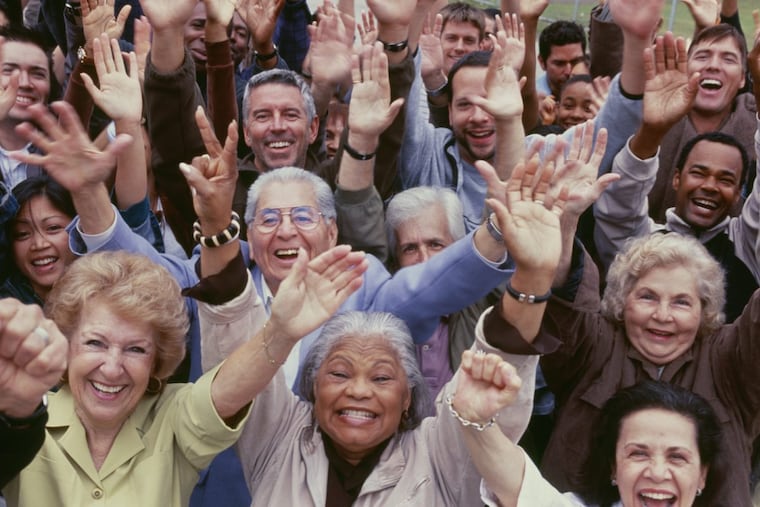'Seasoned?' 'Lucky?' Readers join the debate over what to call older people
Some people think being called "old" is just fine. They're happy to be here, no matter what you call them.

Seasoned. Chronologically gifted. Senior. Just plain old.
All those words had fans among the readers who responded to my essay on the challenges of describing people over age 65 when some chafe at words that even hint at the possibility that they might be past their prime. What do people in this age group want to be called?
The good news is that a lot of people are feeling good about aging and are just thankful they're around. As one online commenter put it: "All that matters is that I am looking down at the flowers. Call me what you want, such a minor matter."
Sol Mayer, 84, said he and his wife live in a large senior community. "Every night we sit in a lounge with a dozen people, most in their 90s, although you wouldn't know it," he wrote. "You want to know what we call ourselves? Lucky! We know it and believe it and live with the hope that we are all there tomorrow."
I'm not sure anyone solved the problem of what words people who write about this vast, aging group should use. But readers had intriguing ideas about how to divide up and describe the large cohort who are past Medicare age.
I thought Spike Souders, an Ambler native who now lives near Washington, D.C., was on the right track when he suggested dividing our lengthening lifespan into quintiles. He was one of many who thinks old is a perfectly fine word, although he is still too young for it. Here are his suggestions: 0-17, youth; 18 to 35, prime; 36 to 52, mature; 53 to 68, experienced, and 69 to death, old. I'm sure my sons, both in their 20s, would love that "prime" category. But how will we remember whether mature is older or younger than experienced? Still, Souders' categories make some sense to me.
Of course, many of you feel no need for categories. Just use specific ages for individuals, you said. Some suggested using generation names, which works pretty well for the oldest and youngest generations. Baby boomers, though, are in their 50s, 60s, and 70s. Many of you considered 70 to be a pretty good place for starting "old." There was more than one vote for categorizing by decades, which could work as long as you don't need to talk about, say, 75 to 95-year-olds.
Here's what Bonnie Dalzell, who turned 80 this year, suggested: "Refer to those in their 70s as septuagenarians, those in their 80s, octogenarians, those in their 90s, nonagenarians, those who reach 100 or more, centenarians. Those in their 60s will love their 'label' – sexagenarians!" True that, but, selfishly, I don't want to have to spell septuagenarian more than once a year.
There was more humor, of course. Two Facebook friends, who are car guys, suggested "classic" and "vintage." Another said he'd be happy to be addressed as "the venerated." We could go with the British "pensioner," another said, except for the fact that most Americans don't have pensions anymore. "When I get to be over 65, you can refer to me as, 'My Liege,' " online commenter Citizen Watchdog said. Daniel Hussar, a pharmacy professor at University of the Sciences, said he prefers "chronologically gifted." Charlotte Hummel, of Lansdowne, said that, after she turned 60 this year, she started referring to herself as "level 6.0." Next year, she'll be level 6.1.
Seasoned or seasoned citizen had serious supporters. Is it just me, or do you imagine pepper and oregano, too? Senior and older adults are still acceptable terms. Edith Kutcher, a 100-year-old participant and volunteer at KleinLife community center in Philadelphia, says people over 90 should be called "plus." There was one vote each for wizened citizens, grownups, and old heads. Alexis Franklin said she likes to think of the 12 women in her rowing club, ages 61 to 81, as "super veterans." Following writer Ashton Applewhite's lead, Sue Ronnenkamp said she calls people over 80 "olders." Her baby boomer peers are "agers." One reader steered me to a thoughtful article on living into old age that Robert Fulford wrote for Canada's National Post. He likes to think of the stage past 80 as "old growth."
A 71-year-old Wynnewood woman said she can't control the labels people use for her. "Let others call me what they will," she wrote. "I just hope they precede the label with some positive words, i.e., kind , fun, funny, hip, cool, knowledgeable, wise, strong, fit, pleasant, caring, etc."
As for ageist language, I learned there are some serious "spry" haters and nobody likes "85 years young." On LinkedIn, a British physician wrote to say she has started asking, "How young are you?" That's a paradigm shifter.
Barbara Greenhow, 84, of West Chester, said she cares about attitude more than words. "Some people call you 'dear' from a loving heart," she wrote. "What I do object to is the occasional sneering attitude of condescension age has to endure from the young. … I find it both amusing and annoying to be spoken to with very slow, loud voices. …
"My strategy is to engage their eyes for a long, holding moment and then graciously smile without saying a word. Then I try to behave in a way that leaves no question that I still have dignity and all my marbles. Sometimes the lightbulb goes on, and sometimes it doesn't. There is no point in getting upset; they will get it eventually. Isn't that the best revenge?"